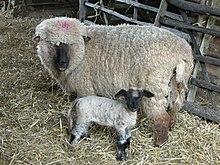Oxford Down
 Ewe and lamb at the Chiltern Open Air Museum | |
| Conservation status | |
|---|---|
| Country of origin | United Kingdom |
| Distribution | Europe, North America |
| Standard | Oxford Down Sheep Breeders Association |
| Use |
|
| Traits | |
| Weight |
|
| Height | |
| Wool colour | white |
| Face colour | brown or black |
| Horn status | polled |
| |

The Oxford Down is a British breed of domestic sheep. It was developed in the 1830s by cross-breeding of Hampshire Down and Southdown ewes with Cotswold rams.[2][4] It is reared primarily for meat.[2]
History
[edit]The Oxford Down developed from about 1830, when Hampshire Down and Southdown ewes were put to Cotswold rams. Much of this breeding took place in the area of Witney in western Oxfordshire, and this gave rise to the breed name.[5] A breed society, the Oxford Down Sheep Breeders Association, was formed in 1889[5] and a flock-book was published in the same year.[6]: 879
In the twenty-first century it is an endangered breed in the United Kingdom, and is listed as 'at risk' on the watchlist of the Rare Breeds Survival Trust.[2][3] A population of just over 1000 head was reported to DAD-IS in 2021.[2] Outside the UK, it is distributed ten other European countries and in Canada and the United States; the global population is estimated to be some 20000 head, and its international conservation status is 'not at risk'.[7][2]
Characteristics
[edit]The Oxford Down is a very large sheep, the largest of the Down breeds, robust and powerful. Rams weigh some 110–145 kg and ewes 90–110 kg.[6]: 879 [5] It is a shortwool breed, white on the body with brown or black wool on the face and lower legs.[6]: 879 [8] It produces the heaviest fleece of any of the Down breeds. Its capacity to produce a large, meaty carcase for further processing has stimulated interest from the meat industry, and it also grows the most wool of any of the terminal sire breeds.[4]
References
[edit]- ^ Barbara Rischkowsky, Dafydd Pilling (editors) (2007). List of breeds documented in the Global Databank for Animal Genetic Resources, annex to The State of the World's Animal Genetic Resources for Food and Agriculture. Rome: Commission on Genetic Resources for Food and Agriculture, Food and Agriculture Organization of the United Nations. ISBN 9789251057629. Archived 23 June 2020.
- ^ a b c d e f g h Breed data sheet: Oxford Down / United Kingdom of Great Britain and Northern Ireland (Sheep). Domestic Animal Diversity Information System of the Food and Agriculture Organization of the United Nations. Accessed December 2022.
- ^ a b Watchlist 2022–23. Kenilworth, Warwickshire: Rare Breeds Survival Trust. Archived 28 September 2022.
- ^ a b Oxford. New Zealand Sheepbreeders' Association. Archived 18 January 2020.
- ^ a b c Oxford Down. Kenilworth, Warwickshire: Rare Breeds Survival Trust. Archived 9 July 2022.
- ^ a b c Valerie Porter, Lawrence Alderson, Stephen J.G. Hall, D. Phillip Sponenberg (2016). Mason's World Encyclopedia of Livestock Breeds and Breeding (sixth edition). Wallingford: CABI. ISBN 9781780647944.
- ^ Transboundary breed: Oxford Down. Domestic Animal Diversity Information System of the Food and Agriculture Organization of the United Nations. Accessed December 2022.
- ^ The Oxford: A Rare Breed of British Origin. Rare Breeds Conservation Society of New Zealand Incorporated. Archived 25 January 2022.
External links
[edit]
